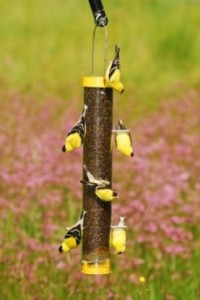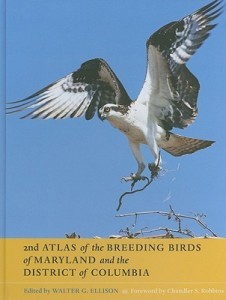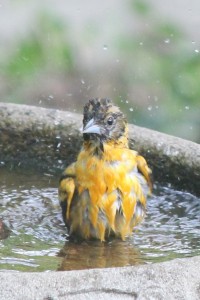Everyone’s asking:
Is it my imagination or are my bird feeders busier than ever this summer?

The Backyard Naturalist Recommends Droll Yankees BUF-16 Bottoms Up Nyjer Feeder for Goldfinches.
You’re not dreaming! Except for the snowiest, coldest days of winter, this is the busiest feeding time of the year. Really? Why? Nesting season is still on folks! Second broods are flying and third broods are fledging. And, hold on! American Goldfinches are JUST getting started.
JUST getting started? This leads us to even more questions:
Why do Goldfinches nest so much later than all the other species?
Goldfinches have only one brood per season. And it is on right now!!! Been wondering where all the female Goldfinches have gone? Now you know!!!
Because the Goldfinch nesting cycle is adapted to the natural growing rhythm of the wild thistle, asters and other plants they use for nesting material and food, they wait for these plants to mature. Plant availability is the cue to these beautiful birds that it is Time!
Hey! Why aren’t they nesting in our bird houses?
Goldfinches are NOT cavity nesters. They nest in shrubs and trees. So, please take care not to disturb them right now with excessive pruning!
Here’s an excellent online source for specific info about Goldfinches: http://www.allaboutbirds.org/guide/American_Goldfinch/lifehistory.
Is there something special we should be feeding them?
Goldfinches are almost exclusively vegetarian — eating seeds and rarely feeding on insects– so they really benefit from backyard feeders containing nyjer(thistle) and (hulled) sunflower. In fact, the evidence is in that Goldfinches are THRIVING!

Excellent reference book uniquely specific to MD & DC!! In stock now at The Backyard Naturalist!
According to the The 2nd Atlas of the Breeding Birds of Maryland and the District of Columbia, the Goldfinch population is thriving due to backyard bird feeders! This unparalleled, fact-filled book (published by Johns Hopkins Press), is a must-have for any local birder. There is no reference book available more specific to our area. This book is awesome and and we’ve been lucky to get some in stock! Come in and see for yourself.
Why do they all need to eat like that in summer?
There’s a population boom going on!
Let’s think about it for a minute and do some math. One male and one female get together and raise up to five babies in two and sometimes even three broods during a spring-summer season. One + One + (Five x Three)… Wow! Exhausted parents and their hungry adolescents all need the same high energy foods, just like in winter, to maintain and restore energy. No wonder those feeders get emptied quickly!
What else can we do to help?

A young Baltimore Oriole takes a dip! Photo by http://imgur.com/vGueg.
Fresh water is critical, so keep your bird baths filled and clean during these hot summer days. Remember, all birds need water to drink and bathe, but not all birds are seed eaters. A good example is our own state bird the Baltimore Oriole. If you are very lucky, even though it’s increasingly less common these days , an inviting bath may tempt these gorgeous birds to visit your backyard.
It’s a good time to get in on the fun. Watching juvenile birds navigate feeders and bird baths is part of the joy not to be missed this time of year! As good hosts and hostesses, our year round activity of providing for birds brings us special joys distinct to each season. But it means far more to the birds. With the increasing loss of natural habitats, our backyards have become a network of micro sanctuaries that not just sustain, but help to increase our bird population.
The Backyard Naturalist can recommend bird feeders and baths that are practical to maintain and also jazz up your garden. Due to popularity and demand brought on by the season’s excessive heat, we’ve just re-stocked with some beautiful bird baths & fountains.
Remember, The Backyard Naturalist is always available with any questions you may have about how to make your backyard a haven for birds.
Good birding!
Debi





